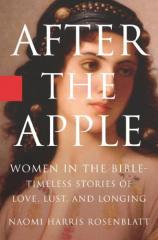Reading Group Guide
Discussion Questions
After the Apple: Women in the Bible: Timeless Stories of Love, Lust, and Longing

1. In Eve, the First Rebel, we read "Guilt spurs us to improve ourselves." (p.11) What are some of the ways in which women feel guilt differently than men? What are the ways in which guilt is considered a good thing?
2. On page 16, the author tells of Eve's leaving the Garden of Eden saying, "All humans must go through the process of leaving home." Talk about the first time you left home and what were your feelings and thoughts at that particular juncture in your life?
3. The author mentions that "generations of male commentators have accused Eve of being a disobedient seductress." Do you think this is so? Why or why not? What leads men to interpret Eve in a particular way, and do you find their approach similar or different than that of women?
4. With regards to their sons, how are Sarah and Rebecca's agonizing conflicts? Rebecca deceives her husband. Do you think there was another way for her to handle the situation?
5. Discuss "free will" in the stories of the Bible. What about the role of morality and accountability?
6. Why did Laban deceive Jacob and send Leah to him instead of Rachel? What part does deception play in the Bible? Are women held more accountable for deception than men?
7. Discuss the Bible's view on polygamy versus monogamy. What different roles do Leah and Rachel play within the family? How do they go from being powerless women to forging an indispensable role for themselves in the history of their people?
8. Infertility was a major issue in Biblical times. How is it dealt with today? What lessons can be gleaned from Rachel's melancholy?
9. In the chapter on Rachel and Leah, it is said that "The wives of Jacob, like all the matriarchs in the Book of Genesis, are united with their husbands by a single focus: their shared dedication to the survival and continuity of their faith and way of life." (p. 106) How are couples of today united? If you are part of a couple, what is your ‘single focus'?
10. In How Delilah Traps the Mighty Samson, we see that by entering into a sexual liaison with Delilah, Samson compromises everything he and his people have worked for. Name some people in history who have done the same. What was Samson's fatal flaw? How is it that he is able to "see" more clearly after his eyes have been gouged out?
11. Michal and David's relationship is a fitting example of a political marriage. More things are at play than just pure love. Can you name some other such pairings in history? Why do you think theirs is considered one of the Bible's most unhappy marriages? How could things have been different? How does Abigail handle the tension with David differently than Michal? Are there lessons to be learnt for us today?
12. The author references the adage, "the hand that rocks the cradle rules the world." With regard to the story of Bathsheba, how does this prove to be true? Discuss the balance of power and how it shifts during the marriage of David and Bathsheba?
13. David is considered one of the fiercest and most courageous warriors in the Bible. Why then does he not act after the vicious rape of his daughter, Tamar, by his son, Amnon?
14. Compare David's wife, Abigail, and the Queen of Sheba. How do they use their wits to persuade men to their point of view? Why do you think that post Biblical versions of the story of the Queen of Sheba focus on a sexual dalliance between the Queen and Solomon?
15. On page 225, the author tells us that "Both Ruth and Esther use seduction as a means of survival in a male-dominated world." What other women in this collection do the same and in what way?
16. Despite it being a patriarchal society, discuss the ways in which the women of the Bible refused to be silenced when the survival of their family and faith were in question.
After the Apple: Women in the Bible: Timeless Stories of Love, Lust, and Longing
- Publication Date: November 2, 2005
- Paperback: 288 pages
- Publisher: Miramax
- ISBN-10: 1401359809
- ISBN-13: 9781401359805






